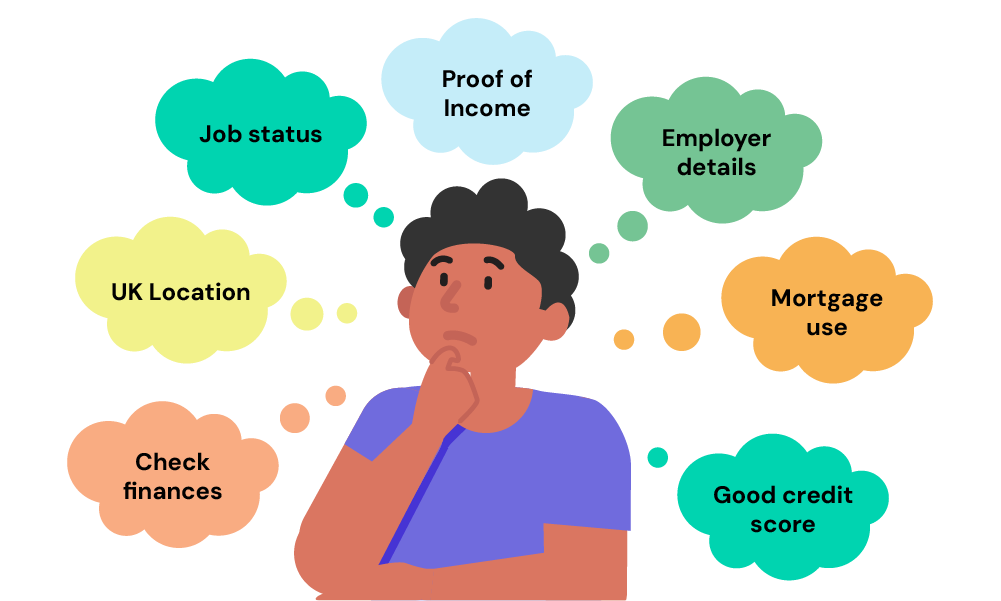- Can I Get a Mortgage with Foreign Income?
- How Applying for a Mortgage with Foreign Income Works
- What Counts as Foreign Income for Mortgages?
- Eligibility Criteria
- How Much Can I Borrow?
- Key Considerations Before Applying
- How To Secure a Mortgage with Overseas Income?
- Who Offers Mortgages for Overseas Income?
- The Bottom Line
A Complete Guide To Mortgages With Foreign Income

Dreaming of owning a home in the UK, but earning your paycheck overseas?
You might be facing stricter criteria from lenders, leaving you wondering if it’s even possible.
We get it. It can be tricky.
That’s why we created this guide to help you ace your mortgage application with overseas earnings.
Here we explore the ins and outs of foreign income, highlighting the unique challenges and opportunities you face as someone earning abroad.
Ready to dive in?
Can I Get a Mortgage with Foreign Income?
Getting a mortgage in the UK when you earn your money in another country is possible, but there are a few things to keep in mind.
Not all lenders will consider foreign income and those that do have specific rules.
These rules can change based on what currency you’re paid in and other personal finance details. Since 2016, there’s been an extra step for lenders.
They need to watch how foreign exchange rates change and tell borrowers if there are big swings.
This has made some lenders less willing to give mortgages to people with foreign income.
The key is to be ready and find a lender that fits your situation, which can make getting a mortgage with foreign income easier.

How Applying for a Mortgage with Foreign Income Works
When you apply for a mortgage and your income is from another country, the first thing lenders do is change that money into British pounds.
The exchange rate they use is crucial because it affects how much they think you can borrow.
But exchange rates can go up and down, so lenders often only use part of your converted income to decide how much to lend you.
For example, if you make $100,000 a year, and it converts to £88,000, a lender might only consider £70,400 of that as income for your mortgage.
They do this to protect themselves from the risk of currency changes.
Understanding how these steps work and getting ready for them is important if you want a mortgage with foreign income. It’s all about knowing how currency changes and rules can affect your application.

What Counts as Foreign Income for Mortgages?
Foreign income is any money you earn outside the UK.
This means any income you earn outside of England, Wales, Scotland and Northern Ireland, including the Channel Islands and the Isle of Man is counted as foreign income.
It can also include foreign investment income, properties you own abroad, income from royalties, or overseas pension income.
To get specific, here are different currencies that may count as foreign income:
- Euros
- Canadian Dollars
- US Dollars
- South African Rand
- Japanese Yen
- Swiss Francs
- New Zealand Dollars
- Australian Dollars
- Polish Zloty
Each lender will have a different income criteria. However, the main thing they want to see is that it’s steady and reliable.
Eligibility Criteria
To qualify, you must tick off these boxes:
- You should be a permanent resident in the UK or have indefinite leave to remain.
- Possess a UK bank account.
- Have resided in the UK for usually between 2 to 5 years.
- Hold a permanent position of employment within the UK.
- Maintain a strong credit history and credit score.
- Show that you can comfortably cover the mortgage payments, taking into account your income and outgoings.
Keep in mind, the exact requirements might differ from one lender to another. For EU nationals, eligibility might change based on their residency status and the specific conditions set by the lender.
How Much Can I Borrow?
The amount you can borrow with a mortgage based on foreign income varies. Lenders typically look at your income, outgoings, and the stability of your earnings in foreign currency.
Generally, you might be able to borrow up to 4 to 5 times your annual income, but this can change depending on your financial situation and the lender’s criteria.
Your specific income and the currency it’s in, as well as any debts or financial commitments you have, will also play a part in determining how much you can borrow.
It’s best to consult with a mortgage advisor to get a clearer idea tailored to your circumstances.

Key Considerations Before Applying
When you’re looking to get a mortgage with foreign income, it’s not just about where the money comes from.
You need to look at the bigger picture of your finances and personal situation. Overlooking these can lead to a declined application and might hurt your chances in the future.
Location
Your location plays a big role. Lenders typically want you to be based in the UK, even if you travel for work.
This isn’t just about where you live now; if you’re applying from abroad with plans to move back to the UK, be ready to explain your situation.
Lenders may have specific rules for people living outside the UK or those planning to return.
Employment Status
Being employed versus self-employed affects your application differently. For the self-employed, it’s crucial to show that you’re registered to pay tax in the UK.
This proves your income is legitimate and sustainable. Lenders look closely at this because self-employed incomes are often seen as less predictable.
Proving Your Foreign Income
How you prove your income depends on how you earn it.
You’ll likely need payslips, tax returns, and bank statements. These documents show lenders that your income is steady and reliable.
The Company You Work For
Who you work for matters. If your employer is not well-known or is a small company outside the UK, lenders might ask for more details to understand the stability of your income.
Purpose of the Mortgage
Why you want the mortgage also influences the lender’s decision. Buying a property to live in, rent out, or use for business each comes with different considerations. Lenders want to know your plans because it helps them assess the loan’s purpose and risk.
Credit History
A good credit history is crucial, especially when you’re bringing foreign income into the picture.
Before you apply, check your credit reports to ensure everything is in order. Mistakes in your report can be fixed, and knowing where you stand helps you address potential issues early.
Before applying, think about these factors and how they fit into your situation. Showing lenders you have a stable, reliable income and a solid financial background can make a big difference in your application.

How To Secure a Mortgage with Overseas Income?
Here’s how you can prepare:
Get Your Paperwork Done
You’ll need to gather a range of documents to prove your income and financial stability.
This usually includes:
- Payslips or proof of income for the last 3-6 months (For employed)
- Certified business accounts and tax returns (SA302) for the last 2-3 years, for self-employed.
- Bank statements showing income and savings for the last 3-6 months.
- Proof of your overseas employment or business.
- Documents for any foreign investments.
- Proof of identification and address like a passport and utility bills.
To make a strong case, organise your documents. Convert foreign documents into English if necessary, and have them officially translated to avoid any misunderstandings.
Check Your Credit Score
In the UK, your credit score plays a big part in mortgage approval.
Check your score with major credit agencies like Experian, Equifax, or TransUnion. If your report has errors, contact the agency to correct them.
If your score is low, try to improve it by paying off debts and keeping credit card balances low.
Boost Your Deposit
The size of your deposit can affect your mortgage application. A larger deposit usually means better mortgage rates because it lowers the lender’s risk.
If your deposit is in foreign currency, convert it to pounds early to avoid exchange rate fluctuations affecting its value.
Some lenders might also want to check the source of your deposit, especially if it’s from abroad, to comply with anti-money laundering regulations.
Speak with the Right Mortgage Broker
A mortgage broker with experience in overseas income can be invaluable. They know which lenders are more open to foreign income and can navigate the complex application process.
To find the right broker:
- Look for brokers specialising in ex-pats or foreign-income mortgages.
- Check their credentials and reviews from previous clients.
- Make sure they have access to a wide range of lenders.
A good broker can match you with a lender that suits your situation, helping you secure a mortgage with your overseas income.
If you want an easy way to connect with a specialist broker, get in touch with us. We’ll set up a free, no-obligation consultation with a broker specialising in overseas income.
Who Offers Mortgages for Overseas Income?
Many lenders are open to accepting foreign income in the UK, though each has its criteria, and not all types of foreign income may qualify.
Here are some high-street banks offering mortgages for overseas income:
- HSBC
- Barclays
- NatWest
- Santander
- Lloyds Bank
This list is not exhaustive. More lenders might consider your income, so consulting a mortgage broker can be helpful in this situation.
The Bottom Line
Applying for a UK mortgage with foreign income can be tricky with lots of steps to follow.
It’s crucial to know the hurdles you might face, such as how lenders convert your foreign income to pounds, assess its stability, and consider your job and location.
Here’s where a broker can help. A good broker, experienced with foreign income, can be a big asset. They understand which lenders are more likely to accept your application and can navigate the tricky parts for you.
The main benefit of using a broker is they can offer you tailored advice, make sure your application is strong, increase your chances of approval, and possibly get you a better mortgage deal than you’d find on your own.
To get started, simply fill out this form. We’ll link you with the right mortgage broker who specialises in mortgages for foreign income.
Get Matched With Your Dream Mortgage Advisor...

Frequently asked questions
Can I get a mortgage in Northern Ireland with overseas earnings?
Yes, it’s possible to secure a mortgage in Northern Ireland using overseas earnings. The process and requirements are similar to those in other parts of the UK.
However, the choice of lenders might differ, as some may have specific policies for Northern Ireland.
Working with a broker experienced in Northern Ireland properties and foreign income can help navigate these nuances.
Can I get a buy-to-let mortgage with an overseas income?
Yes, you can get a buy-to-let mortgage with overseas income. You usually need at least a 20% deposit, sometimes more depending on the country.
Your yearly income should be over £25,000, including money earned abroad. The rent you charge needs to cover 120% to 140% of your mortgage payments.
Having a good credit history helps, but some lenders might also consider you if your credit isn’t perfect.
Remember to think about taxes in both the UK and where you’re buying, as well as how exchange rates could affect your investment. An experienced mortgage broker can make the whole process easier for you.
This article has been fact checked
This article was created, checked, and verified by the expert team at Money Saving Guru. Trust us, you’re in good hands.




